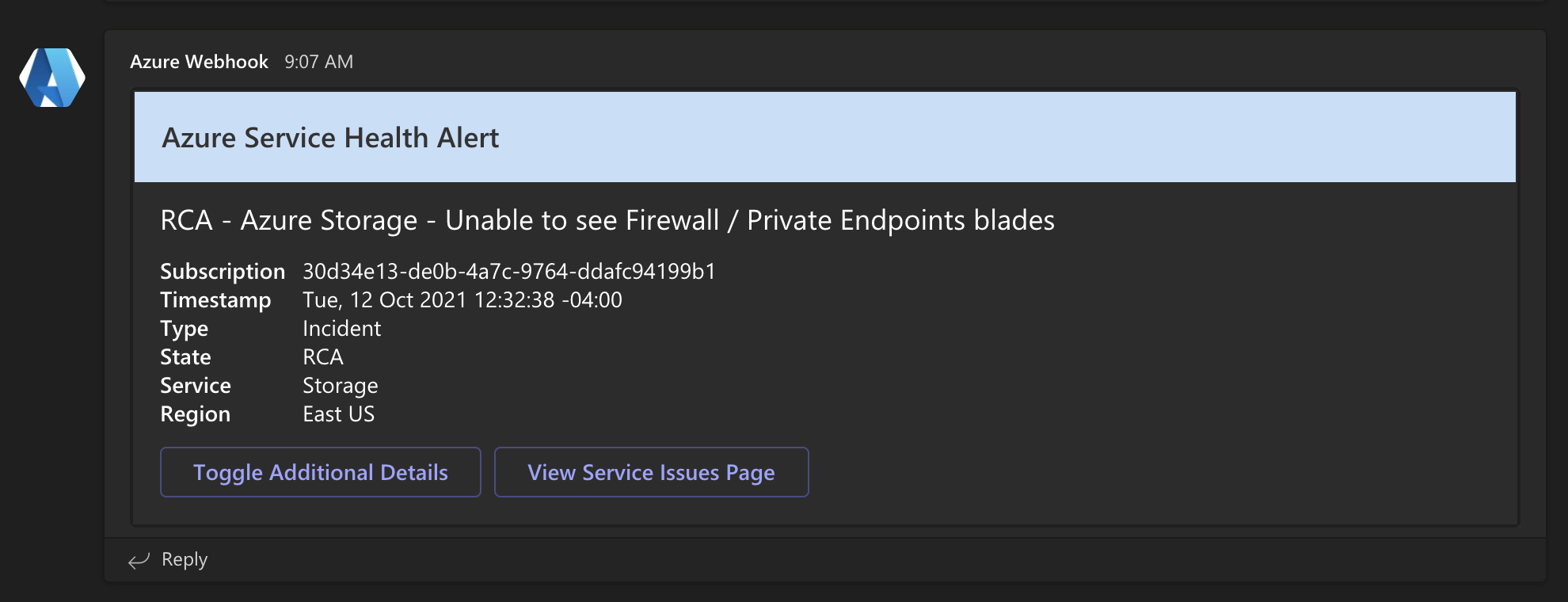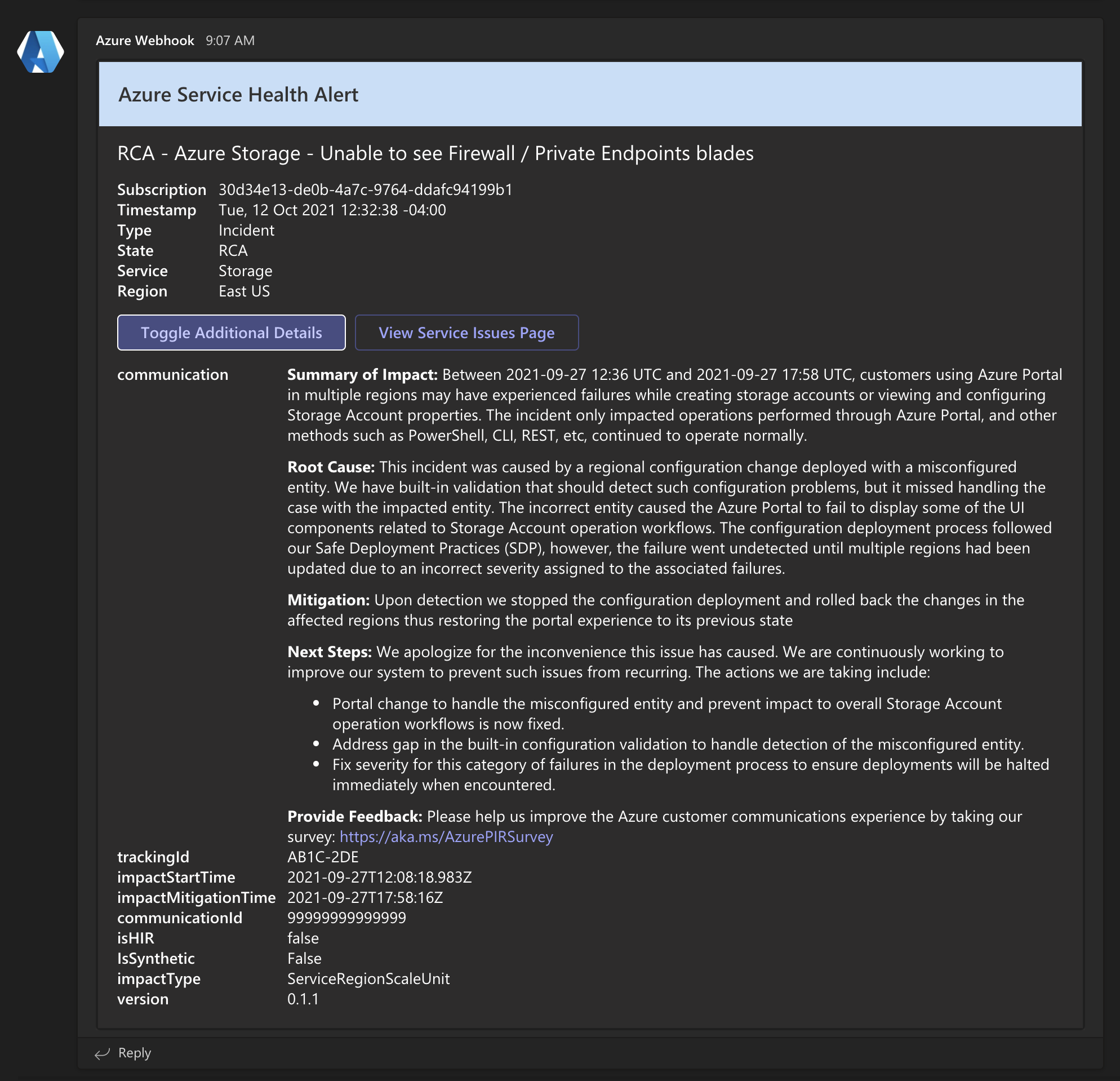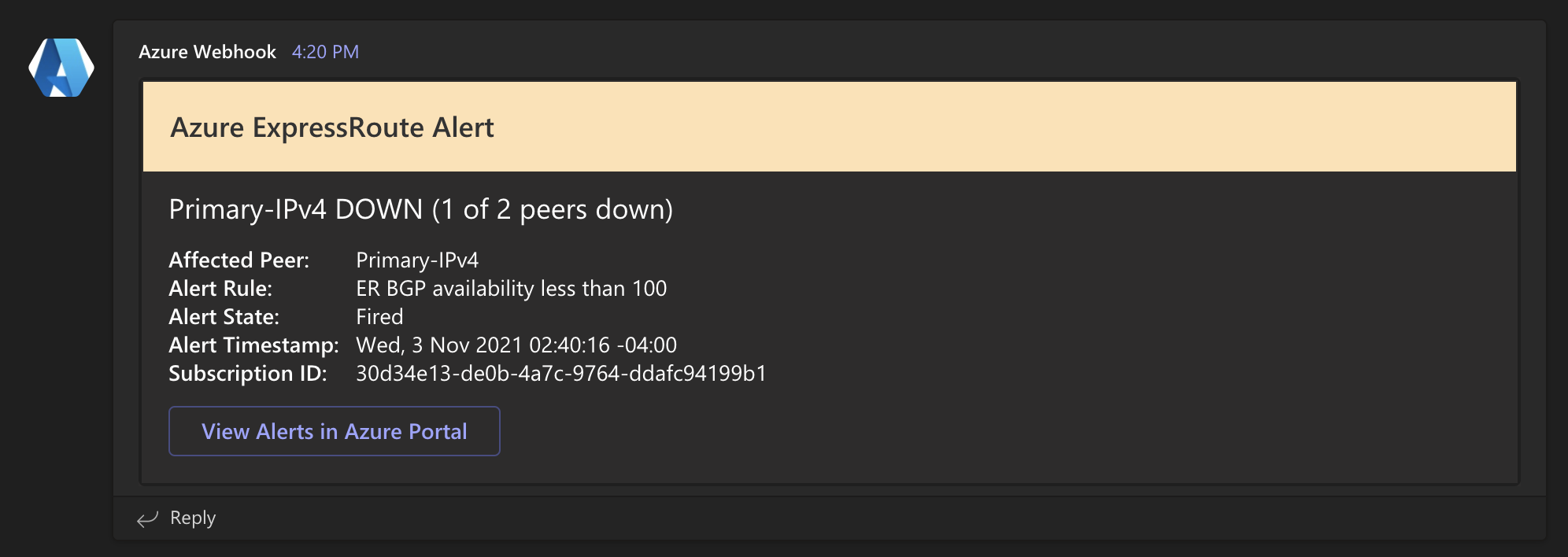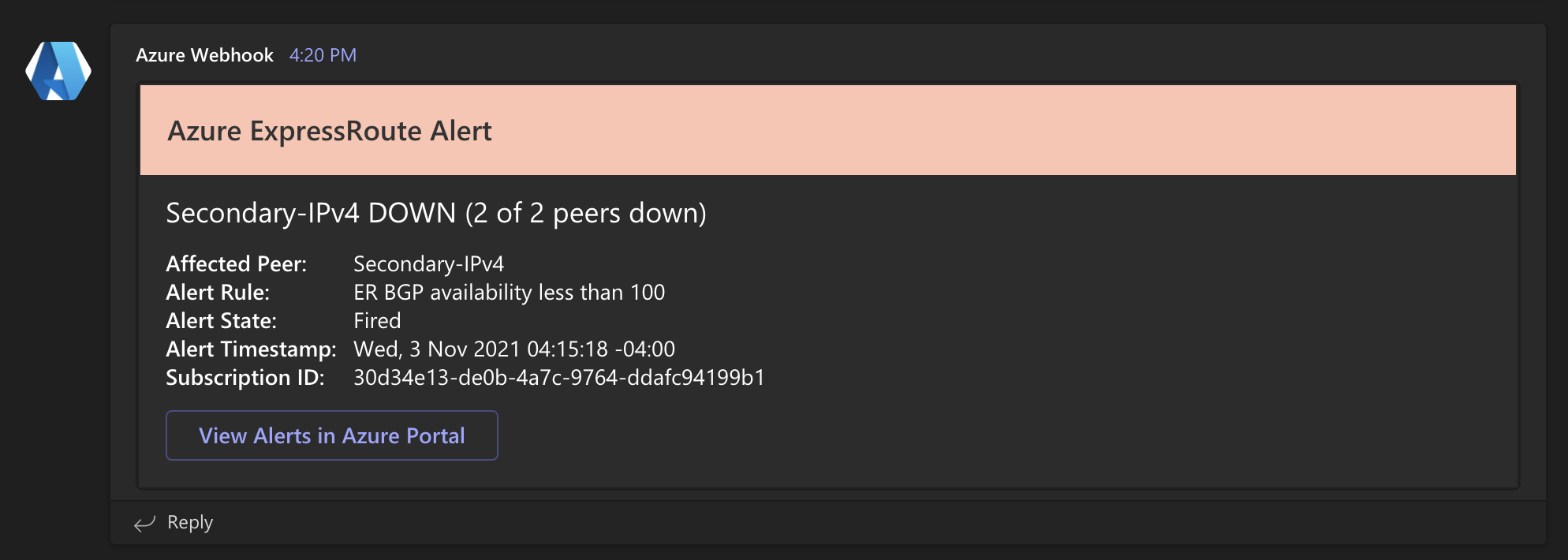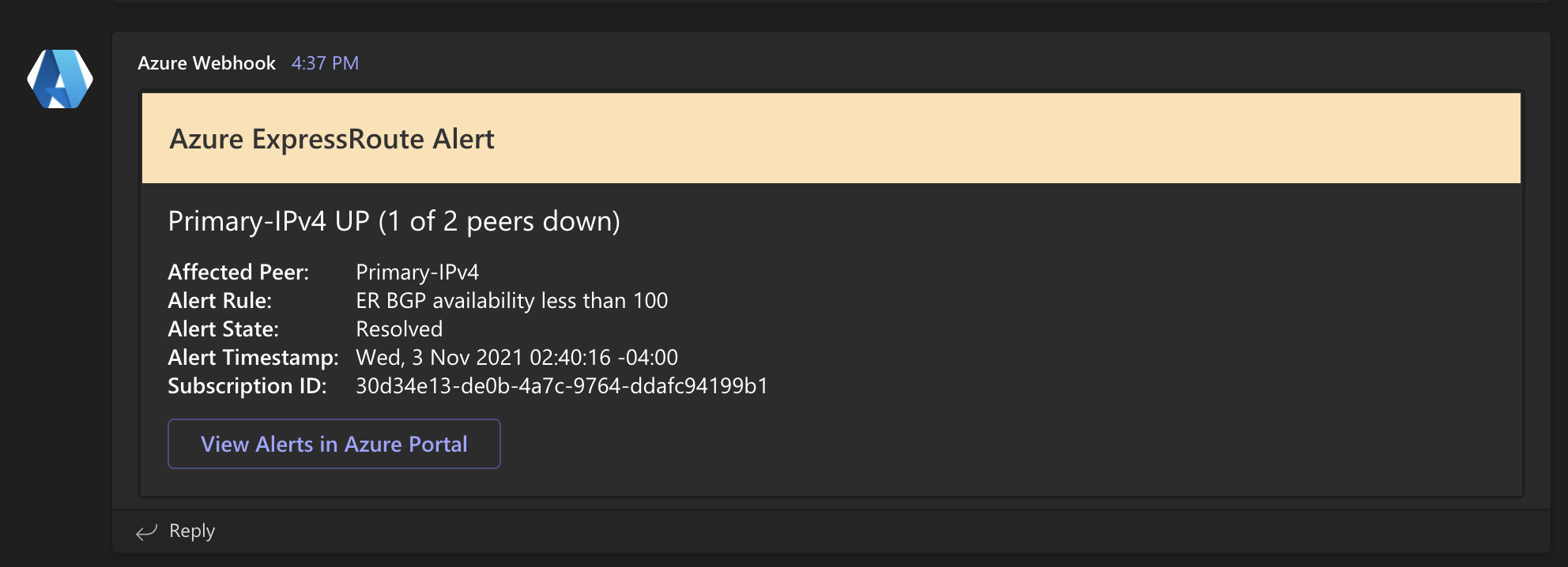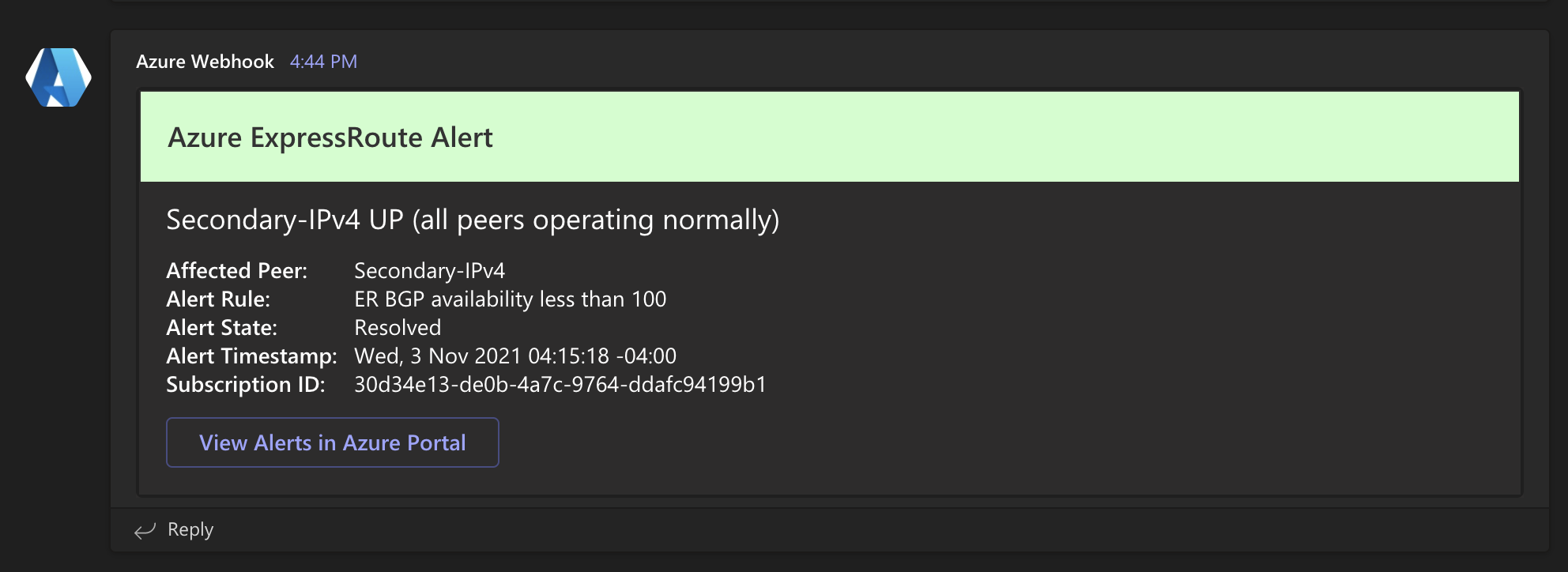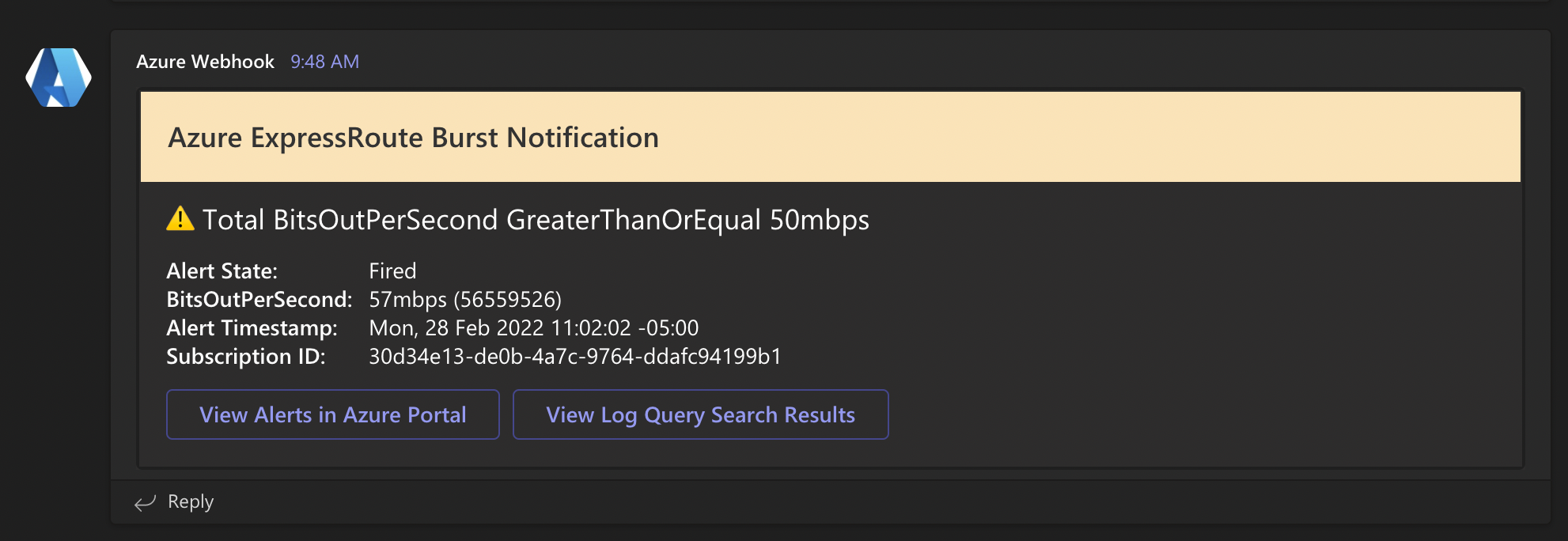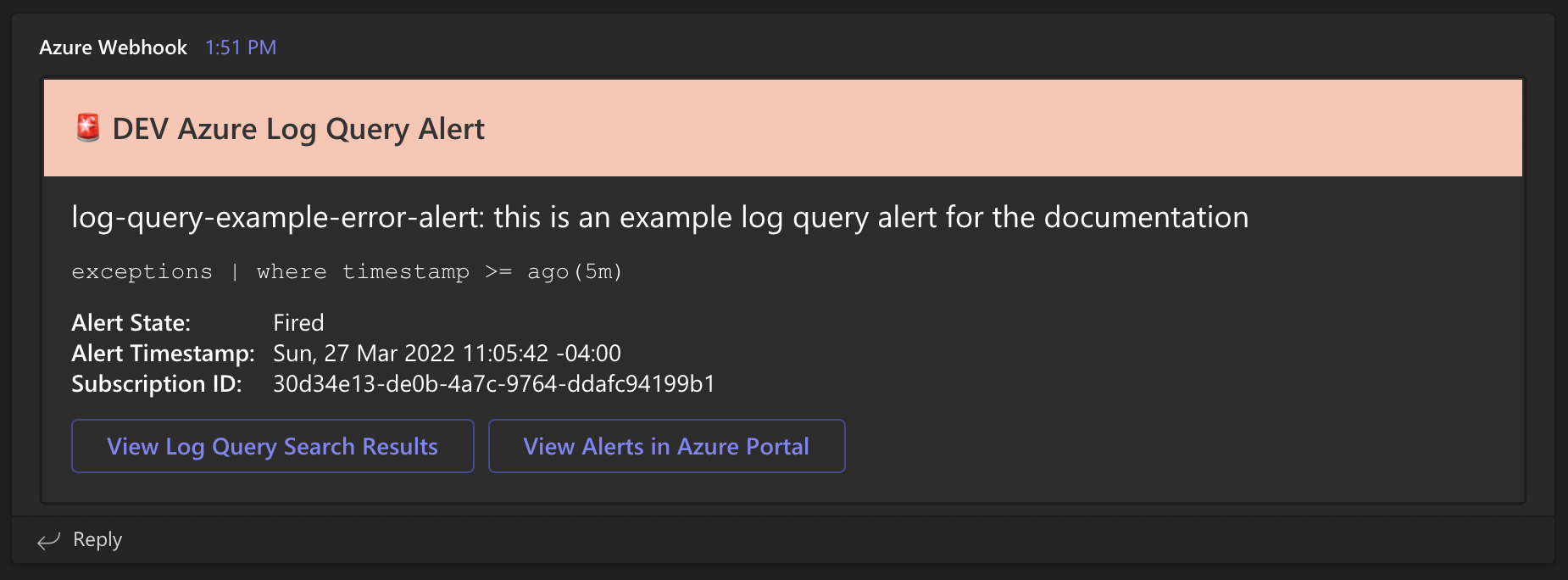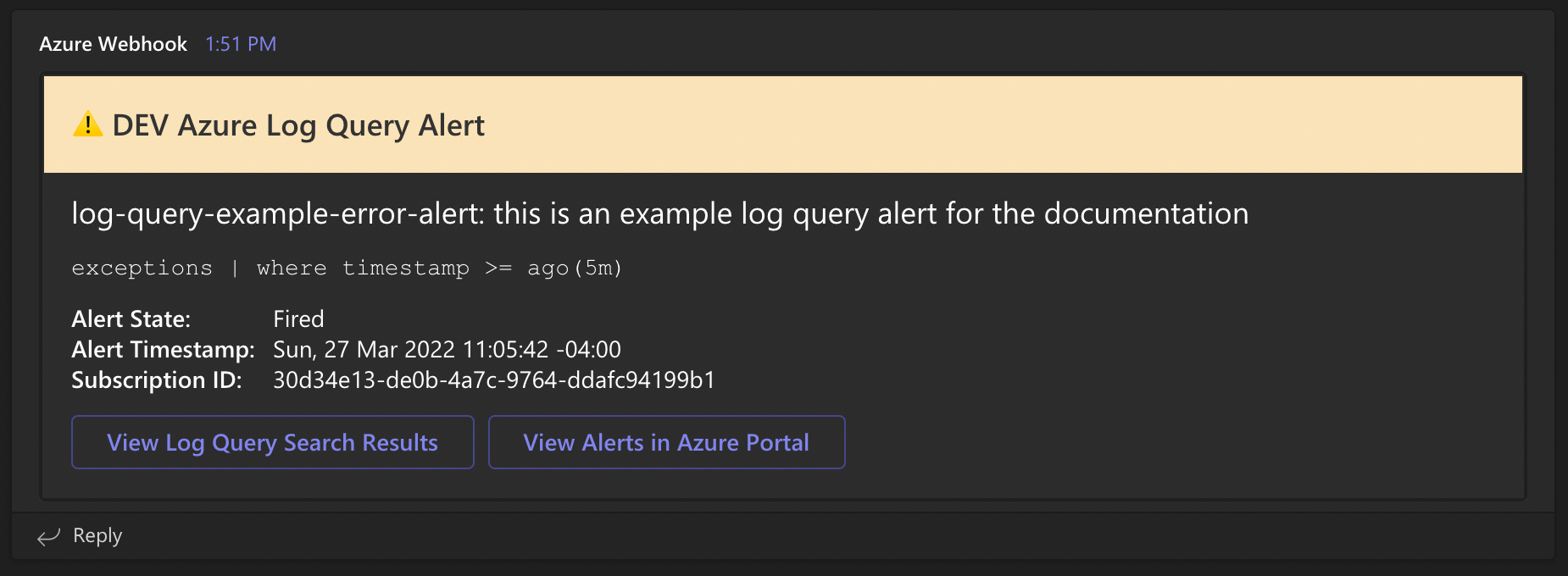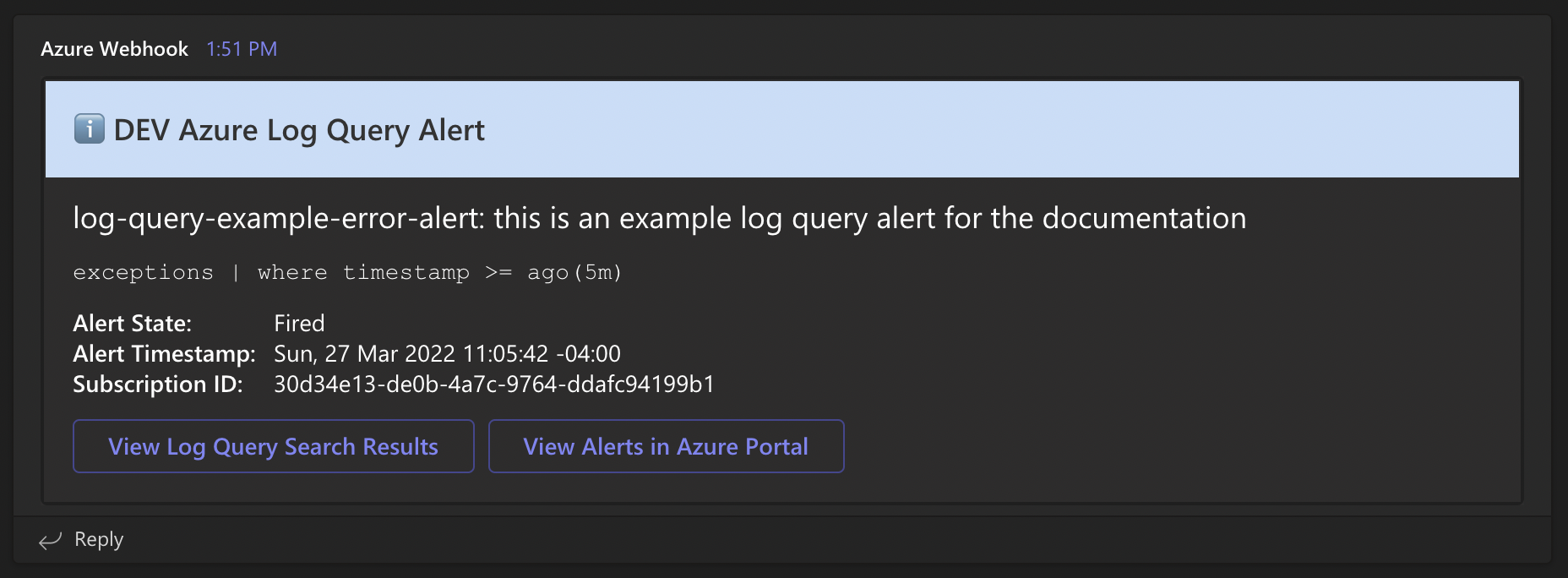Azure Function for an HTTP endpoint to receive Azure Monitor alerts that use the Common Alert Schema
| Branch | Status | CI/CD Build Trigger |
|---|---|---|
dev |
Pushes to dev branch |
|
main |
PR to main branch |
Accepts alert data from Azure Monitors using the Common Alert Schema - formats alert data as an AdaptiveCard and then sends it to an MS Teams Incoming Webhook
- Type: HTTP Trigger
- Auth: Anonymous
- Accepts:
- Method:
POST - Content-Type:
application/json - Schema:
azureMonitorCommonAlertSchema
- Method:
- Currently Supported Alerts
-
Azure Service Health Alert
- Schema
- Details:
- Gives most important info at a glance
- Color bar changes based on incident type/stage
- Buttons to toggle additional details or go to service issues page in Azure Portal
- HTML in communication converted to Markdown so it displays properly
- Examples:
-
ExpressRoute Platform Alert
- Schema
- Details:
- Gives most important info at a glance
- Color bar changes based on alert type and number of peers affected
- Button to go view the alert in the Azure Portal
- Additional Notes/Requirements
- Manages state using a JSON file (kept in Blob Storage inside the Function App's existing storage account)
- You can specify the blob container (useful for dev vs prod) by setting an environment variable:
BLOB_CONTAINER_NAME- Uses default value of
functions-dataifBLOB_CONTAINER_NAMEis not provided
- Uses default value of
- Examples
-
ExpressRoute Bursts via log query search
- Schema
- Currently supports ExpressRoute BitsInPerSecond/BitsOutPerSecond Log Searches
- Example query:
AzureMetrics | where MetricName == 'BitsOutPerSecond' and Maximum >= 50000000 | order by TimeGenerated desc | limit 10 | where TimeGenerated > ago(10m) | summarize BitsOutPerSecond = sum(Maximum) by TimeGenerated - Details:
- Gives most important info at a glance
- Color bar and icon changes based on alert status
- Button to go view the alert in the Azure Portal
- Button to view the log query results in the Azure Portal
- Currently set to fire if it's in violation for at least 2 of the last 3 evaluation periods (eval period is currently 5 minutes)
- Examples:
- Example query:
-
Log Queries (Application Insights Log Alert / Log Alerts V2)
- Schemas
- Details
- Generic heading identifies it as an Azure Log Query Alert
- Color bar and icons change based on alert severity (alert severity is chosen during setup, it's a user controlled value)
- Includes alert rule name, description (if provided), and log analytics search query to make it easier to grok what's alerting
- Button to view the log query results in the Azure Portal
- Button to view alert(s) in the Azure Portal
- Examples
-
- Actions secrets:
- REQUIRED
AZURE_FUNCTIONAPP_PUBLISH_PROFILE- Publish profile for production function app
AZURE_FUNCTIONAPP_PUBLISH_PROFILE_DEV- Publish profile for dev function app
MS_TEAMS_WEBHOOK_URL- URL of MS Teams Incoming Webhook to be used for deploy notifications
MS_TEAMS_WEBHOOK_URL_DEV- URL of MS Teams Incoming Webhook to be used for dev function app deploy notifications (can be same as
MS_TEAMS_WEBHOOK_URL)
- URL of MS Teams Incoming Webhook to be used for dev function app deploy notifications (can be same as
MS_TEAMS_ALERT_WEBHOOK_URL- URL of MS Teams Incoming Webhook to be used for deploy failure notifications (can be same as
MS_TEAMS_WEBHOOK_URL)
- URL of MS Teams Incoming Webhook to be used for deploy failure notifications (can be same as
ACTIONS_STEP_DEBUGfalse(set totruefor additional debug output in GitHub Actions logs)
ACTIONS_RUNNER_DEBUGfalse(set totruefor additional debug output in GitHub Actions logs)
- REQUIRED
- Node.js >= v20.x
- npm >= v9.x
-
Clone repo
git clone https://github.com/cu-cit-cloud-team/az-common-alert-endpoint.git your-folder-name -
Enter directory
cd your-folder-name -
Install dependencies
npm install -
Set up environment variables in
.envandlocal.settings.json:- REQUIRED
MS_TEAMS_NOTIFICATION_WEBHOOK_URL- URL of MS Teams Incoming Webhook to be used for informational notifications
MS_TEAMS_ALERT_WEBHOOK_URL- URL of MS Teams Incoming Webhook to be used for actionable alerts (can be same as
MS_TEAMS_NOTIFICATION_WEBHOOK_URL)
- URL of MS Teams Incoming Webhook to be used for actionable alerts (can be same as
- OPTIONAL
MS_TEAMS_DEV_WEBHOOK_URL- URL of MS Teams Incoming Webhook to be used for unsupported payloads and development - if not provided, function will fall back to
MS_TEAMS_NOTIFICATION_WEBHOOK_URL
- URL of MS Teams Incoming Webhook to be used for unsupported payloads and development - if not provided, function will fall back to
NOTIFICATION_TIMEZONE- Timezone db name to use for formatting timestamps in notifications - defaults to
America/New_York(full list)
- Timezone db name to use for formatting timestamps in notifications - defaults to
BLOB_CONTAINER_NAME- Name of the Azure Blob container to use for storing state files - defaults to
functions-data
- Name of the Azure Blob container to use for storing state files - defaults to
SUB_DISPLAY_NAME_IN_DESCRIPTION- Used to indicate whether the SHA rule(s) have the subscription name in their description (value should be
trueorfalse)
- Used to indicate whether the SHA rule(s) have the subscription name in their description (value should be
SUB_DISPLAY_NAME_SEPARATOR- Some identifying text that can be used to extract the subscription name from the description if above value is true (e.g.
for:if the description is "Some Alert Rule for: Subscription Name" and you wanted to extract "Subscription Name" for the SHA notification)
- Some identifying text that can be used to extract the subscription name from the description if above value is true (e.g.
LOCAL_DEV- Set to
trueto override alert and notification webhooks during development - Make sure to also set up
MS_TEAMS_DEV_WEBHOOK_URLwith a value or it will fall back toMS_TEAMS_NOTIFICATION_WEBHOOK_URL
- Set to
WEBSITE_RUN_FROM_PACKAGE- Change to
0to trick the runtime into reloading when changes are made (otherwise you have to manually stop and run again)
- Change to
- REQUIRED
-
Run locally
npm run functions(for verbose logging usenpm run functions:verbose)
Assumes functions are running locally using instructions above and you are in the root of the repo directory in your terminal
curl -X POST -H "Content-Type: application/json" --data "@assets/sample-data/service-health-alert.json" http://localhost:7071/api/alert-endpoint